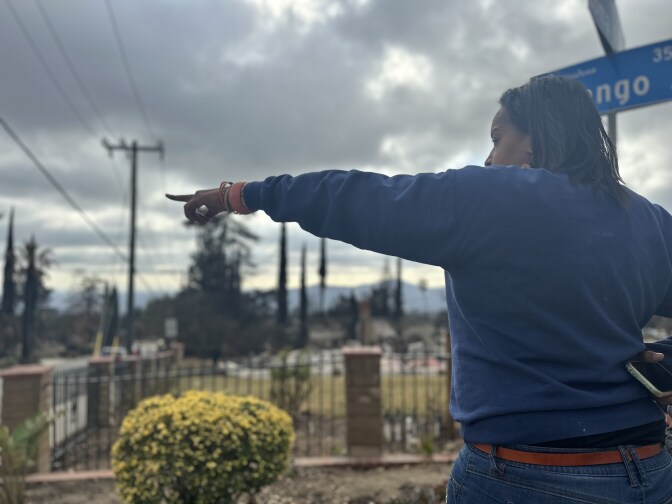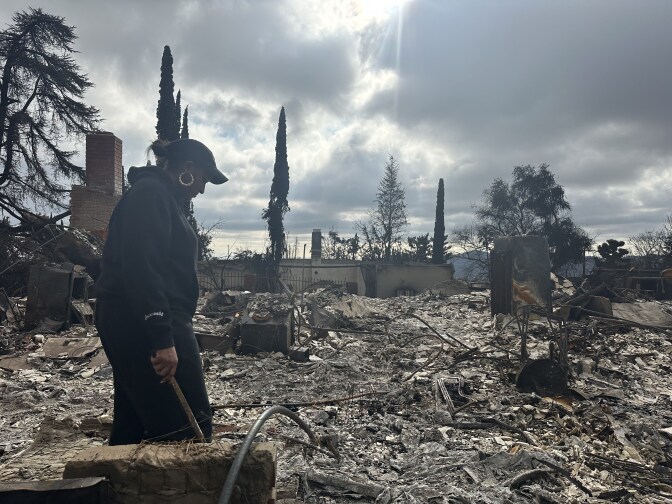This story is free to read because readers choose to support LAist. If you find value in independent local reporting, make a donation to power our newsroom today.
Rebuild or leave? In Altadena’s Black community, a family grapples with their future after the Eaton Fire

On Feb. 7, exactly a month after the devastating Eaton Fire, the Baileys gathered at the site of their family home in Altadena to look through the rubble.
The wildfire had reduced their pale yellow four-bedroom, ranch-style house to heaps of melted metal and gray ash.

Charel Bailey-Dickson, now in her forties, grew up in that house, along with her sister and cousin. Her parents, Al and Charlotte Bailey, were involved in the local church, hosting a small group ministry in their home for nearly a decade. Even after Charel moved out, the home remained a hub, not just for the Baileys, but their whole community.
“We have a friend that used to call our house the party house. And we've had weddings, celebrations, divorce parties, a baptism in our pool,” said Al Bailey. “We knew everybody on our block, everybody in the neighborhood.”
Charel desperately wants her parents to rebuild. Growing up, her dad stressed the value of homeownership, and she had imagined her kids and grandkids growing up in the family house, surrounded by Altadena’s Black community.
But in the immediate weeks after the Eaton Fire, her 77-year-old dad has been on the fence.
“It's hard because you go through a thousand emotions, when you look at the devastation,” said Al Bailey. “When you're in the second stage of life and you see it's going to take a year to maybe even three [to rebuild] ... you have thoughts of moving on.”
How redlining shaped Altadena’s Black community

Al and Charlotte Bailey first rode into Altadena in 1977, on Al’s motorcycle. They recalled how brightly the stars shone in the night sky, and how they fell in love with the mountains and small town feel. But there were systemic barriers to Black couples buying a home.
Throughout the early and mid-20th century, it was common for real estate agents to not sell houses in certain neighborhoods to people of color. As part of discriminatory practices known as redlining, banks would refuse to give loans, and white property owners often specified in their deeds that they wouldn’t sell or rent to people of certain races.
These practices continued informally for decades — even after racial covenants were no longer held up by the courts, and the Civil Rights Act of 1964 and the Federal Fair Housing Act prohibited discrimination in housing.
In the 1960s, Altadena was mostly white. But amid the Civil Rights Movement, tensions over school integration, the building of new freeways and the Watts Uprising, many white residents left.
“ There was a lot of white flight out of Altadena during those times. And so it left a huge housing market that Black people were able to come in and settle,” said Marne Campbell, associate professor and chair of African American Studies at Loyola Marymount University.
During the 1970s in Altadena, Lake Avenue was the community’s racial dividing line. When the Baileys called about listings on the east side of Lake Avenue, they were told the houses had sold and were redirected to homes west of Lake, which is why Altadena’s Black community was concentrated in west Altadena.
“It still affects our lives today,” said Veronica Jones, president of the Altadena Historical Society. “There's less trees on the west side of Altadena than the east side. There's more power lines on the west side. There's more liquor stores on the west side. And if you come to Altadena now, the west side is the most diverse side.”
According to U.S. Census data, by 1980, Altadena was 43% Black. It became a Black middle-class enclave and cultural hub, home to icons like Sidney Poitier and Octavia Butler. Many Black families in Altadena have owned their homes for generations. Nearly 75% of Black residents living there own their homes, which is about double the national rate.
“ Altadena is a really great example of the lemonade that Black people made out of the lemons they were given,” LMU's Campbell said. “It's taken a long time for Black families to build and have this kind of generational wealth.”
Today, Altadena’s residents are 58% people of color, with Black residents making up 18%. Experts have attributed the drop to gentrification and rising home prices.
The Baileys experienced this firsthand. They said they’ve noticed fewer Black neighbors throughout the years, and that the sense of Altadena’s community had started to erode. Last year, Al Bailey considered selling the house to move to Fresno, where housing and the cost of living is cheaper, but ultimately the Baileys decided to stay.

Weighing whether to rebuild
After the Eaton Fire, almost immediately, the question of whether Altadena was going to rebuild, and who would rebuild it, was in the air.
Homeowners reported getting text messages with offers of all-cash payments for their properties.
Some locals said they were afraid the single-family homes and wide tracts of land that made up Altadena would get replaced by more dense development, or more expensive housing. “Altadena not for sale” yard signs and posters dotted the community.
A report from UCLA, published in late January, found that because of Altadena’s history of redlining, the Black community was disproportionately affected by the Eaton Fire. The study authors wrote that the fire would disrupt the transfer of generational wealth in Black families and, along with rising home prices, could “threaten to erase Altadena’s Black community altogether.”
“What I hear from the Black community is they want to be here; they want to stay; they want to build back,” said Jones of the Altadena Historical Society. “But on the other hand, do they all have the resources? I don't know.”
Residents have to face factors including their insurance coverage, the length of the cleanup and rebuilding process, and their willingness to wade through bureaucratic questions and a yearslong timeline. Like Al Bailey, 57% of Black homeowners in Altadena are over age 65.
Despite the uncertainty, the Baileys also said that the Eaton Fire has renewed a feeling of community in Altadena. They’re on a new group chat with all the neighbors on their block
“There's a reason now to come together and have some dialogue,” Al Bailey said. “In spite of our differences, at least sit down at the table and start talking.”
The Baileys make a decision

In the weeks after the fire, LAist followed up with half a dozen Black residents of Altadena, who seemed to be in a similar place as the Baileys — looking around at their neighbors, trying to decipher what decision everyone else was going to make.
On Feb. 7, after visiting the site of his former house, Al Bailey said he was thinking back on the decades he spent in Altadena. He had visited one of his regular restaurants that morning.
“I hadn't been there in a couple of weeks, and people knew our situation, and they just welcomed us,” he said. “This is where I belong. This is where my family was raised.”
“This is where people care,” added Charlotte Bailey.
Campbell lives in Baldwin Hills, a historic and prominent Black neighborhood in L.A. She says that she and her neighbors in other predominantly Black neighborhoods are watching Altadena too.
She listed Baldwin Hills, View Park, Leimert Park. "We're all watching Altadena to see what happens,” Campbell said. “We know how magical and rare to have such a big, important community of connection.”
For Jones, rebuilding comes with an opportunity to correct the wrongs of the past.
“Altadena ... I don't really want it to come back the same. I want it to come back better. I would like the west side and the east side to look more alike,” said Jones. “To correct those things [from redlining] that happened in the '60s and '70s.”
Many Altadena residents are still deciding what they’ll do, but the Baileys have made their decision. They’re going to rebuild.
“My prayers that both my wife and myself are able to see what happens. That we're still here when Altadena gets rebuilt," Al Bailey said. “This is my community, and I can’t leave it.”
To listen to the Imperfect Paradise episode, click below.

Charel Bailey’s parents have lived in Altadena since 1977, and she desperately wants them to rebuild after the fire. Her dad has been on the fence. We follow the Baileys as they grapple with this question and ultimately, come to a decision.
Charel Bailey’s parents have lived in Altadena since 1977, and she desperately wants them to rebuild after the fire. Her dad has been on the fence. We follow the Baileys as they grapple with this question and ultimately, come to a decision.









